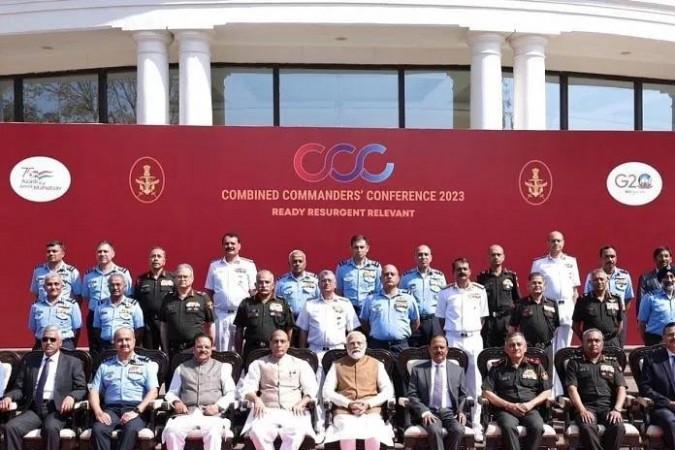
Prime Minister Narendra Modi inaugurated and addressed the 16th Combined Commanders' Conference at the Indian Army's Eastern Command headquarters, Vijay Durg (formerly Fort William) in Kolkata on September 15, 2025. The three-day biennial forum concluded its first day with the prime focus on reforms, transformation, and operational preparedness of India's armed forces under this year's theme: "Year of Reforms – Transforming for the Future." The event brought together the nation's top military and civilian leadership including Defence Minister Rajnath Singh, National Security Advisor Ajit Doval, Chief of Defence Staff General Anil Chauhan, and all three service chiefs.
This gathering marked the first Combined Commanders' Conference since Operation Sindoor, a significant tri-service military campaign aimed at dismantling terrorist infrastructure across the Line of Control and deep inside Pakistan. In his keynote address, PM Modi hailed Operation Sindoor as a demonstration of India's calibrated, precise, and professional military response, emphasizing that "New India will never compromise on security and self-respect."
Prime Minister Modi outlined an ambitious roadmap focused on institutional reforms and greater integration among the Army, Navy, and Air Force. Central to his address was the pressing need for accelerated establishment of integrated theatre commands to ensure unified command and seamless synergy across multiple domains of warfare. PM Modi stressed adoption and indigenous development of advanced technologies, highlighting artificial intelligence, unmanned systems, quantum communications, and cyber defence as critical to future operational readiness.

A key pillar of the conference was PM Modi's reaffirmation of the Atmanirbhar Bharat (self-reliant India) defence vision. He announced strong measures to boost domestic defence manufacturing, emphasizing that self-reliance in critical military technologies is "non-negotiable." Additionally, PM Modi announced the setting up of a specialized inter-agency task force dedicated to cyber and space security to counter emerging hybrid and non-conventional threats. The formulation of focused doctrines and enhanced inter-agency coordination in these domains was underlined as imperative.
PM Modi's address signaled a clear intent to future-proof India's armed forces through reforms that enhance agility, decisiveness, and multi-domain operational preparedness covering land, sea, air, space, and cyber spheres. He called on senior military leadership to institutionalize these changes to keep pace with rapidly evolving threats and technological advancements, reinforcing that India's security posture must be both robust and forward-looking.
The conference format includes interactive sessions involving officers of various ranks, blending field-level insights with strategic-level discussions. It continues through September 17, focusing on the operational nuances and strategic implementation of announced reforms.
The Combined Commanders' Conference at Kolkata also coincides with a period of regional complexity, with tensions along India's borders and dynamic geopolitical realities involving neighbours such as China, Pakistan, Bangladesh, and Nepal. PM Modi's visit reflected a broader political context, happening in West Bengal ahead of crucial assembly elections, underscoring the intersection of national security priorities and regional dynamics.

Strategic Significance and Future Outlook
The 2025 Combined Commanders' Conference represents a defining moment in India's defence evolution. It marked a decisive shift from tactical military responses to broad-based strategic transformation driven by integration, technology, and self-reliance. The commitments made signal that integrated theatre commands will soon be institutionalized, resulting in streamlined command structures capable of rapid, coordinated responses across multiple fronts.
Technology adoption in emerging fields such as artificial intelligence, quantum computing, and autonomous systems will underpin India's military modernization, while heightened focus on cyber and space domains positions India to face new generation hybrid threats. The reinforced emphasis on indigenous defence production aligns with economic and strategic imperatives, promising a more sustainable and self-sufficient defence industrial base.
Looking forward, this wave of reforms initiated in 2025 is expected to mature into a resilient security architecture by 2030, elevating India to a regional leader in defence innovation and strategic autonomy. Success will depend on sustained agility, policy coherence, and deepened civil-military synergy elements highlighted repeatedly throughout the conference proceedings.
Prime Minister Modi's participation and the substantive announcements set a benchmark for the next decade, charting a course for a future-ready Indian armed forces prepared to safeguard national interests amid an unpredictable global security environment.
[Major General Dr. Dilawar Singh, IAV, is a distinguished strategist having held senior positions in technology, defence, and corporate governance. He serves on global boards and advises on leadership, emerging technologies, and strategic affairs, with a focus on aligning India's interests in the evolving global technological order.]

















